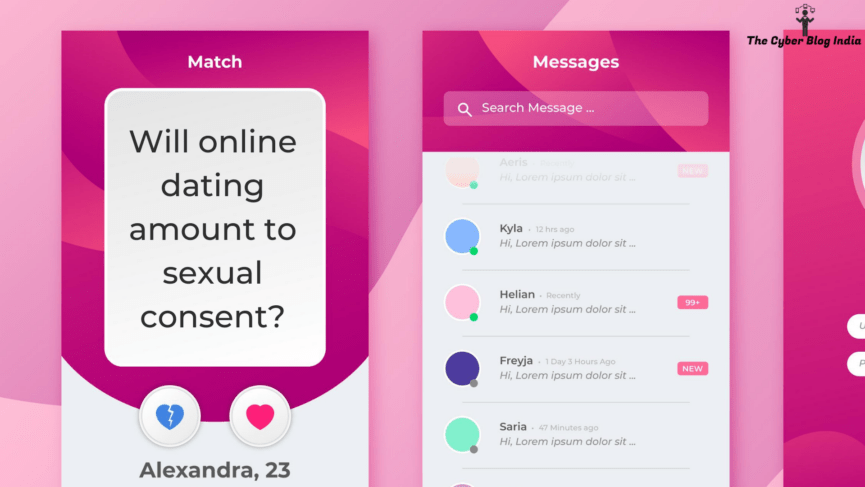Will online dating amount to sexual consent?

Online dating apps like Tinder, Happn, Aisle, and Bumble have revolutionised dating in India. Users interact through these apps with other individuals they have never met before, based on their likes and dislikes over text messages and calls. This initial conversation may not give a complete idea about the kind of person they are talking to on the other side. This is where most problems lie, and uncertainty in giving and understanding consent is one of them.
Indulging in sexual activities is an extensive desire behind the usage of dating apps. Many users, therefore, tend to think that this is the predominant purpose of dating apps. In the light of these statements, I will be discussing the concept of sexual consent in this article. Put plainly, we can define sexual consent as consent given to perform sexual activities. A crucial aspect of any sexual assault or violence is the absence of consent. In online dating space, users usually grant sexual consent through messages before actually meeting the other party in person. In a study conducted by David S. Hall, he found that most sexual activities progress with consent granted non-verbally. When a party grants non-verbal consent, the other party can easily misinterpret or misunderstand what is being agreed to.
Types of consent on dating apps
Consent practices vary significantly from case to case. However, as per the existing literature, there are two types of computer-mediated consent processes.
- Consent signalling: This is where parties use the interface of a dating app to give their implied consent to sexual activities without any explicit validation of consent. In simpler terms, you consent to sexual activities by using the app and without any overt confirmation. The users are required to understand that such an app intends to help them in finding sexual partners.
- Affirmative consent: The parties express their overt consent to performing sexual activities before meeting in person. Later, when they meet, this is verbally reconfirmed face-to-face. It necessitates the parties to give consent free from uncertainty like a humble no or a shy yes. Some of the apps inform the users to seek consent from each other before engaging in sexual activities.
Why do we need to talk about consent on dating apps?
News reports throw light on the negative side of the dating apps such as rape, harassment, extortion, cheating, etc. At times, consent is taken from a party through force, coercion, and undue influence. In Pune, a man raped an air hostess he met through Tinder. The accused allegedly forced her to drink alcohol. Later, he forced himself upon her and raped her even when she did not give her consent in the first place. Research has shown that dating app users report lower levels of sexual consent and higher levels of sexual coercion and violence, including sexual assault, sexual harassment, and rape.
Men and women have reported the pressures they have undergone to commit sexual activities. However, most of them hesitate to say no as they feel unsafe in doing so. Such behaviour can be expected regardless of any dating app we use because there are people who use these platforms only to victimise other users.
There are also instances where dating apps enable person to pretend like somebody they are not or be deceitful. The promises made under such impersonation may lead to sexual consent from the other party. In Bengaluru, the police arrested a man for allegedly cheating and raping a woman he met on a dating app. The accused pretended to be an unmarried man and also made a promise of getting married to the victim.
How not to obtain consent?
Even though dating apps try to provide a safe and healthy experience, the spike in the number of cases that we receive make us question the verification process deployed by dating apps. This rise in the number of cases has made it even more necessary to discuss the significance of consent. Based on the unfortunate incidents happening around us, we can infer that anyone can use these apps and present themselves as approachable and harmless. From the examples discussed above, it is possible to obtain sexual consent when the other party is:
- under the influence of alcohol and/or drugs
- under the impression that the person or the promises are genuine
And there will be instances where a party does not obtain the consent at all.
Precautionary measures
As a user, it is best for us to be a step forward and follow necessary precautions while using online dating apps.
- Understand the app’s purpose thoroughly and its various features.
- Do not give consent with uncertainty. At the same time, do not say no with uncertainty or ambiguity.
- Avoid extensive sharing of your personal information before verifying the identity.
- Prefer meeting the person face-to-face in public places and avoid isolated locations.
- Share information with a friend or a family member before leaving for your date.
If any of the above given scenarios happen with you, do not give up. There are legal provisions available to protect you and hold the individual responsible for their actions. Some of these provisions include Sections 292, 354A, 354B, 354C, 354D, 376, and 503 of the Indian Penal Code, 1860, along with Sections 66C, 66D, 66E, 67, and 67A of the Information Technology Act, 2000. For more information on safety precautions for women, I will recommend you to read this article: Online Dating in 2021: Cyber Safety Precautions for Women.
Featured Image Credits: Technology vector created by freepik – www.freepik.com
